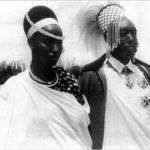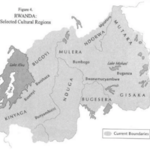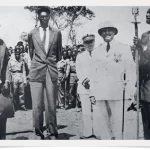The Death of Kabego
At the time of the Rwandan attacks, Kabego was an old man whose long reign had been peaceful until the outbreak of the succession struggle. It does not appear that Kabego himself took any active role in these struggles; he was above the battle for the kingship. At the time of the second Rwandan attack, he had retired, with certain members of the royal family and a few chosen subjects, to the small island of Kishushu just off the western shore of Ijwi.
The Rwandan armies drove south from Malambo along the western shore of the island, always on the advice of Nkundiye, reports from Ijwi have it. At Mitsimbwe, near the thin waist of the island dividing north from south, the armies of the south made their defensive stand. There are many differing accounts of the battle at Mitsimbwe: some have Nkundiye providing canoes for the Rwandan troops to outflank the Havu defensive positions; others refer to the Rwandans’ deceit in sending the Havu troops poisoned cattle, or cattle as a false signof friendship. Still others say that houses were burned behind the Havu forces and the Bany’Iju, thinking they were surrounded and defeated, lost heart and fled. Those who stayed were routed by the Rwandan forces.
The primary and immediate objective of the Rwandan victory was achieved with the death of Kabego and his small entourage on Kishushu. Led to Kabego’s refuge by Nkundiye (or by a disgruntled servant), Rwandan troops under the leadership of Rwanyonga (one of Rwabugiri’s most celebrated military leaders) surrounded the island in canoes at dawn. They attacked and easily overwhelmed the small force protecting the king, who was killed at the door of his hut by Rwanyonga himself.The head and testicles of the old king were taken to be added to the ritual regalia of the Rwandan court. The body of Kabego never did receive a ritual burial on Ijwi, and today on the island it is not known how the body was disposed of. Just prior to the Rwandan attack, according to most sources, Kabego had sent off his son Ndogosa with the royal ivory bracelets and probably other elements of the Ijwi regalia. But the principal symbol of kingship—the drum named “Kalinga”—and other royal regalia were hidden in a cave on the eastern side of Ijwi, and were never seized during Rwabugiri’s time on the island. Ndogosa fled to Bushi (to Lwindi—considered the source of kingship in the region) and stayed there for the duration of Rwandan rule on Ijwi. Rwabugiri’s initial objective had been achieved—personal revenge on Kabego, the king who had flouted Rwabugiri’s hegemony over Ijwi.
The initial effect of the Rwandan victory was almost a scorched-earth policy in the south. Many houses were burned; cattle were taken by individual groups of Rwandan soldiers and never found their way to Rwabugiri; goods were taken, crops were destroyed, and women were seized and sometimes taken back to Rwanda. The initial reaction of the island people, defenseless before such powerful and arbitrary force, was to flee. Those who had close relatives on the western mainland fled there; most, however, went to the forest. Large groups often fled together, camping in the rugged mountainous forest stretching east-west across the island just south of the waist, and in other forested areas. Some of them stayed there for the duration of Rwabugiri’s administration of Ijwi, and the traditions of such groups do not include accounts of his attacks and subsequent events. However, it was more indicative of Rwabugiri’s objectives that the Bany’Iju were encouraged to return to their homes after a few months and that most of them did. Rwabugiri’s amnesty was an honorable one; there are only scattered reports of victimization found on Ijwi.
In a sense the anarchic period following the death of Kabego and the order accompanying Rwabugiri’s arrival only confirm the fundamental ideology on Ijwi toward kingship: anarchy necessarily exists in a kingless situation, but inevitably a king will be attracted into the political vacuum and calm will be restored. The arrival of Rwabugiri into the political vacuum is consequently described in the same terms as the process of expansion of kingship throughout the area. And in fact itseems true that calm was restored and continued throughout the rule of Rwabugiri on Ijwi
https://uk.amateka.net/the-death-of-kabego/https://uk.amateka.net/wp-content/uploads/2024/01/Lake_Kivu.pnghttps://uk.amateka.net/wp-content/uploads/2024/01/Lake_Kivu-150x150.pngHistory of kingsSocial & cultureAt the time of the Rwandan attacks, Kabego was an old man whose long reign had been peaceful until the outbreak of the succession struggle. It does not appear that Kabego himself took any active role in these struggles; he was above the battle for the kingship. At the...BarataBarata rpierre@ikaze.netAdministratorAMATEKA | HISTORY OF RWANDA



